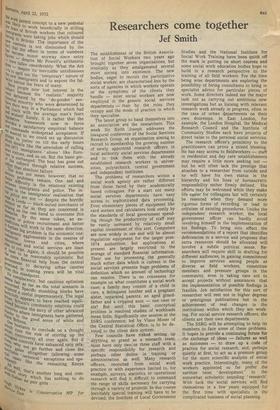Researchers come together
Jef Smith
The establishment of the British Association of Social Workers two years ago brought together seven organisations, but ironically as they amalgamated several more sprung into existence. The new bodies, eager to recruit the participative social worker, are characterised less by the sorts of agencies in which workers operate or the symptoms of the clients they handle — most social workers are now employed in the generic social services departmtnts — than by the roles they occupy and the mode of practice in which they specialise.
The latest group to band themselves into an association are the researchers. This week Sir Keith Joseph addresses the inaugural conference of the Social Services Research Group, an organisation aiming to recruit to membership the growing number of newly appointed research officers in local authority social services departments and to link them with the already established research workers in universities, polytechnics, central government and independent institutes.
The problems of researchers within a social work agency are rather different from those faced by their academically based colleagues. For a start not many social services departments have easy access to sophisticated data processing. Even elementary pieces of equipment like card sorters and calculators look costly by the standards of local government spending though the productivity of staff may be vastly increased by relatively small capital investment of this sort. Computers are now widely in use and will be almost regulation equipment for the larger post1974 authorities, but applications at present are largely restricted to the storage of standard financial information. Their use for processing the generally much softer data which is current in the social services presents huge problems of definition which no amount of technology can resolve. There is no consensus for example on what constitutes a social work case; a family may consist of a child in care, a delinquent brother and a pregnant sister, separated parents, an aged grandfather and a crippled aunt -one case or six? But until this basic conceptual problem is resolved studies of workloads mean little. Significantly one session at the SSRG conference, led by Vlaus Moser of the Central Statistical Office, is to be devoted to the client data system.
Few councils have risked setting up anything so grand as a research team; most have only two or three staff with a specific responsibility for research and perhaps other duties in training or administration as well. Many research officers, recruited from social work practice or with experience limited to, for example, surveys, statistics or operational research will find it difficult to command the range of skills necessary for carrying through a variety of projects. In due course inevitably special training will have to be devised; the Institute of Local Government Studies and the National Institute for Social Work Training have been quick off the mark in putting on short courses and some social work education bodies hope to build in a research perspective to the training of all field workers. For the time being wise departments are exploring the possibility of hiring consultants to bring in specialist advice for particular pieces of work. Some directors indeed see the major task not as carrying out ambitious new investigations but as liaising with relevant research work already in progress, often in the case of urban departments on their own doorsteps. In East London, for example, the London Hospital, the Medical Research Council and the Institute of Community Studies each have projects of direct value to the personal social services.
The research officer's proximity to the practitioners can prove a mixed blessing. He has easy access to fieldworkers — staff in residential and day care establishments may require a little more seeking out — but he will often lack the prestige that attaches to a researcher from outside and he will have his own status in the hierarchy and his lines of bureaucratic responsibility rather firmly defined. His efforts may be welcomed while they make life easier for colleagues but will certainly be resented when they demand more rigorous forms of recording or lead to criticism of existing procedures. Unlike the independent research worker, the local government officer can hardly avoid involving himself in the implementation of his findings. To bring into effect the recommendations of a report that identifies deficiencies in a service and proposes that extra resources should be allocated will involve a subtle political sense. Researchers will require skill in drafting for different audiences, in gaining commitment to improve services among people as diverse as field workers, committee members and pressure groups in the community, even in taking care not to accept projects without assurances that the implementation of possible findings is feasible. Job satisfaction for this sort of researcher will rest not in higher degrees or prestigious publications but in the achievement of real changes in the institutions within which they are working. For social service research officers, the clients are their own departments.
The SSRG will be attempting to help its members to face some of these problems. It hopes to provide a continuing forum for the exchange of ideas — failures as well as successes — to draw up a code of practice for social research, and, perhaps quietly at first, to act as a pressure group for the more scientific analysis of social work practice. Interestingly, many of the workers appointed so far prefer the earthier term development' to the somewhat scholastic sounding research'. With luck the social services will find themselves in a few years equipped for the first time with specialists in the complicated business of social planning.










































 Previous page
Previous page